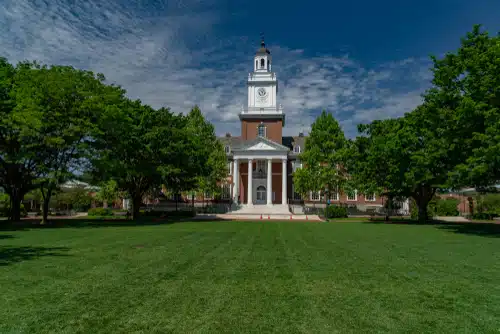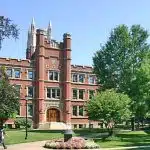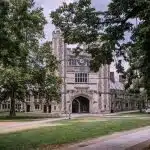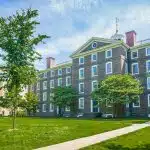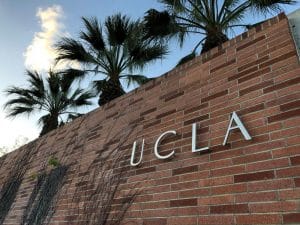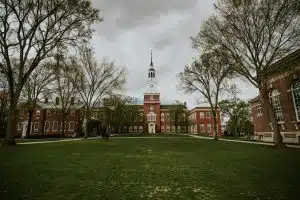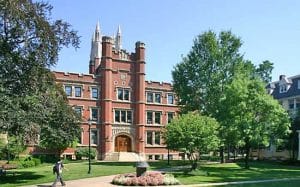So, you’re probably in the middle of building your college list, or maybe you’re just curious, and Johns Hopkins University has come up. You might be wondering: What is Johns Hopkins University known for? And is Johns Hopkins a good school for someone like you?
In this blog, we’ll closely examine what makes Johns Hopkins University unique. We’ll also cover how its academic rigor and campus culture make it a great fit for driven students who want to impact their fields.
- Top 8 Things Johns Hopkins Is Known For
- Should You Apply to Johns Hopkins?
- Frequently Asked Questions
- Takeaways
Top 8 Things Johns Hopkins Is Known For
When you hear “Johns Hopkins,” chances are the first thing that pops into your head is medicine-related. And honestly, that makes sense—it’s one of the top names in health and science. But here’s what you might not know: there’s more to Johns Hopkins than just stethoscopes and lab coats.
Here are some of the standout things Johns Hopkins is known for:
1. Legendary for medicine and public health
Johns Hopkins has been a global leader in healthcare innovation for decades:
- The School of Medicine consistently ranks among the top medical schools in the United States. It is placed #2 in Research, according to the U.S. News & World Report (2024).
- They’re also home to the Bloomberg School of Public Health, ranked #1 in Public Health. It is the oldest and largest school of its kind in the world.
But here’s what’s really cool: you don’t have to wait until med school to get involved. Undergrads can dive into hands-on experiences through programs like the Provost’s Undergraduate Research Awards (PURA), which fund independent research projects.
Students can also participate in Observerships, where they shadow healthcare professionals across a range of roles from patient care to hospital operations. It’s an educational experience designed to give students a real-world look at what a typical day in healthcare looks like, no stethoscope required.
2. A powerhouse in scientific research and innovation
For the 44th year in a row, Johns Hopkins led the entire nation in research spending, with a jaw-dropping $3.4 billion poured into projects in just one year. According to the National Science Foundation, that’s $1.6 billion more than the next closest school.
And the results speak for themselves: Johns Hopkins researchers co-developed a reduced-intensity haploidentical bone marrow transplant that has shown a 95% survival rate and 88% cure rate for adults with severe sickle cell disease, offering a safer, more accessible alternative to expensive gene therapies.
They also created the Johns Hopkins COVID-19 Dashboard, a globally recognized tool that provided real-time data on COVID-19 cases, deaths, and vaccinations. They became a vital source for researchers, policymakers, and the public.
Basically, whether you’re interested in neuroscience, biology, environmental science, or even space exploration, there’s real, hands-on work happening here that you can be part of. Undergrads can tap into this innovation through programs like those offered at the Krieger School of Arts and Sciences, which support research across a wide range of scientific disciplines.
3. Global affairs and political powerhouses
If you dream of working for the State Department or tackling international challenges, Johns Hopkins has a place for you, too.
Their Political Science and International Studies majors are super strong, and you can even take part in programs that give you hands-on experience with diplomacy and global policy.
One of the crown jewels is the Paul H. Nitze School of Advanced International Studies (SAIS). SAIS trains leaders in international relations, economics, and policy, with campuses in Washington, D.C., Europe, and China, and a focus on solving complex global challenges.
They also offer a wide range of study abroad opportunities that let you take your education global. Johns Hopkins students have studied global health in Brazil, India, and South Africa, conducted research in London, and interned in Chile.
If a full semester abroad doesn’t fit your schedule, short-term options exist in places like Cuba, Florence, and Japan during the summer or Intersession.
4. Elite programs in writing and the humanities
Johns Hopkins isn’t just for science geeks. If you’re all about creativity, storytelling, or the power of words, their Writing Seminars program is one of the best in the country. The program offers a BA and MFA, focusing on poetry, fiction, nonfiction, and screenwriting at a super high level.
Many well-known authors, including Pulitzer Prize winners Louise Erdrich and screenwriter Wes Craven, have come through the Writing Seminars program. You’ll get to workshop your writing with award-winning professors and published authors.
5. Engineering and tech with a purpose
The Whiting School of Engineering has top-notch programs in biomedical engineering (BME), computer science, and mechanical engineering. They’re known for blending tech with health, science, and design. The Biomedical Engineering (BME) program has been ranked No. 1 in the nation for 33 consecutive years.
As an undergrad, you’ll dive into innovative projects from the start, working in state-of-the-art research labs like the Johns Hopkins Institute for NanoBioTechnology (INBT), where students explore cutting-edge work in nanomedicine and tissue engineering.
You’ll also have access to the Johns Hopkins Hospital’s Applied Physics Laboratory (APL), renowned for its work in bioengineering, and the BME Design Studio, where you’ll prototype real-world medical devices.
6. Competitive acceptance rates
Johns Hopkins’s acceptance rate has been steadily dropping, meaning more and more students are vying for those coveted spots. Here’s a look at the most recent numbers:
| Johns Hopkins Class | Total Applications | Acceptance Rate |
| Class of 2028 | 45,134 | 5.7% |
| Class of 2027 | 38,926 | 7.6% |
| Class of 2026 | 37,844 | 7.3% |
| Class of 2025 | 39,515 | 7.5% |
| Class of 2024 | 29,612 | 8.8% |
As you can see, competition is getting tougher. But don’t let that scare you off! If you have the passion and determination, you can stand out. Keep pushing yourself to excel in everything you do.
7. Unique and fun traditions
Johns Hopkins has some traditions that go way beyond its academics. Men’s lacrosse has been a part of the school since 1882, winning 43 national championships. One of the most meaningful traditions is the memorial ceremony at each season’s first home game, honoring 10 former lacrosse players who died in wars.
Also, ever wondered why there’s an extra “s” in Johns Hopkins? It actually comes from his great-grandmother’s maiden name, Margaret Johns. Fun fact: Johns’ formal education ended when he was just 12, and later, he and his brothers sold whiskey known as “Hopkins Best.”
8. Top-tier rankings
Overall, Johns Hopkins ranks #6 in the U.S., solidifying its place among the top universities. Globally, the school holds the #16 spot. The university is known for its groundbreaking discoveries that are changing the world. These rankings highlight Johns Hopkins’ excellence in research quality and its contributions to various industries.
Should You Apply to Johns Hopkins?
If you’ve read this far, you’re probably seriously considering it. So let’s wrap this up by discussing whether Johns Hopkins might be the right place for you.
Choose Hopkins if
- You love a good academic challenge and thrive in rigorous environments.
- You’re passionate about research and want access to cutting-edge labs and faculty mentorship.
- You’re interested in medicine, public health, science, writing, or global affairs.
- You want to be part of a globally respected institution with a strong alumni network.
- You’re motivated, curious, and ready to make a real impact even as a student.
Maybe think twice if
- You’re looking for big football games, Greek life, and a party-heavy social scene.
- You’re not into academic rigor or don’t enjoy being pushed intellectually.
- You prefer a laid-back, less competitive academic atmosphere.
- You want a more traditional campus vibe with lots of school spirit and tailgates.
- You’re uncomfortable navigating city life or want a more rural or suburban campus.
Johns Hopkins is an incredible place for driven students ready to dive deep into their passions. It’s not for everyone, and that’s totally okay. College is all about fit. If you see yourself thriving in a fast-paced, intellectually intense environment, Johns Hopkins might be your place.
Frequently Asked Questions
1. Is Johns Hopkins Ivy League?
Johns Hopkins isn’t technically in the Ivy League, which comprises eight schools in the northeastern U.S. However, Johns Hopkins is often considered a “Hidden Ivy” due to its exceptional academics, research, and prestige. So, if you’re more focused on what a school offers than its label, the school is definitely worth considering.
2. Is Johns Hopkins only good for pre-med students?
Nope, not at all. While it’s true that Hopkins has a top-tier med school and public health program, it’s also amazing for international studies, writing, and engineering. You can major in Political Science, study abroad in places like Brazil or Japan, or even build tech that helps people through the BME program.
3. How hard is it to get into Johns Hopkins?
Johns Hopkins has an acceptance rate of just 5.7%, so it’s definitely competitive. But don’t freak out; strong grades, meaningful extracurriculars, and a standout application can give you a real chance. They use a holistic review process, meaning they care about who you are.
4. Do I have to be rich to afford Johns Hopkins?
Nope, you really don’t. Even though the full cost is close to $89K a year, most students pay way less because of financial aid. Johns Hopkins promises to meet 100% of your demonstrated financial need with scholarships and grants, not loans. So if your family can’t cover the full price, they’ll help make it work.
5. Is Johns Hopkins a good school?
Absolutely! Johns Hopkins is known for its rigorous academics, which are perfect for students who love a challenge and want to grow. The school culture is collaborative, with plenty of study groups and mentorship opportunities, creating a community focused on everyone’s success.
Plus, internship access is top-notch, with connections to big employers like Amazon, Google, and Microsoft through the Life Design Lab, helping students gain valuable real-world experience.
Takeaways
- If you’re into medicine, science, or solving big world problems, Johns Hopkins is kind of a legend.
- If you’re more into writing, politics, or global issues than science, Johns Hopkins has elite programs in those areas, too, so don’t count it out.
- With a super competitive 5.7% acceptance rate, Johns Hopkins attracts some of the brightest minds out there.
- Even though it’s not technically the Ivy League, Johns Hopkins plays in the same league with its rankings, resources, and major brainpower.
- If you aim for Johns Hopkins and want to stand out in a sea of top applicants, AdmissionSight’s Private Consulting Program gives you the insider strategies and personalized support to maximize your shot.


